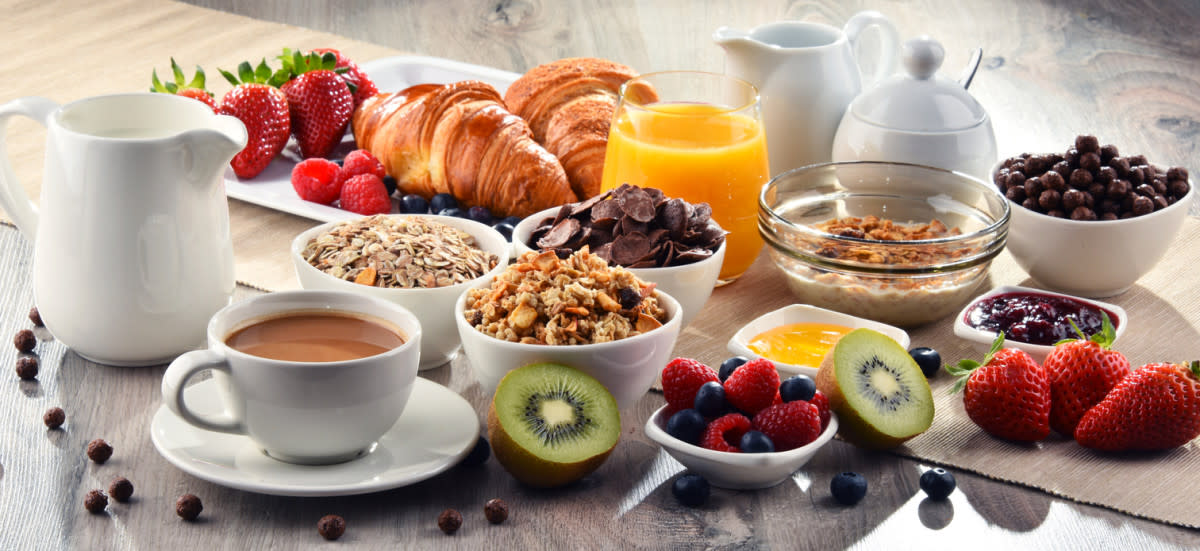'I'm a Nephrologist and This Is My Favorite Breakfast for Kidney Health'

Breakfast food
Kidney health is not typically something top of mind for people when they make their breakfast. Brain health and heart health? Maybe. But does what you eat in the morning actually impact your kidneys all that much? The truth is, it does—and it’s worth it to choose foods that support them.
The kidneys help filter waste and impurities from the blood by producing urine, helping control blood pressure and producing hormones that stimulate red blood cells. As we age and chronic health conditions become more likely, the kidneys have to work harder—which is why it’s important to do everything you can to support them.
One way to do that is through diet, including starting the day off with a kidney-supporting breakfast. Need some inspiration? Here, a nephrologist shares his favorite breakfast for kidney health and gives more tips for how to eat with kidney health in mind.
Related: The One Thing You Should Absolutely Never Do If You Want to Keep Your Kidneys Healthy
How To Eat With Kidney Health in Mind
If you want to prioritize your kidney health through what you eat, Dr. Ndidi Nwamu-Laguerre, DO, a nephrologist and physician esthetician at Delta Kidney & Hypertension, says it’s important to minimize salt intake and avoid processed foods. “Use herbs and spices to season food instead of salt,” she suggests.
The reason why excess salt is detrimental to kidney health is because it contributes to high blood pressure. This isn’t just bad for the heart; it makes the kidneys work harder too. High blood pressure is the leading cause of kidney failure. With this in mind, it’s recommended to keep sodium intake under 2,300 milligrams a day.
Dr. Nwamu-Laguerre says that a kidney-friendly diet is one that’s high in fruits and vegetables, which contain many different nutrients that support the kidneys. This type of diet is important for preventing kidney problems and even more critical for people already experiencing kidney problems. “When people's kidneys get weak over time, changing their diet is a way to protect your kidneys from getting worse,” Dr. Nwamu-Laguerre explains.
Related: This Is the #1 Sign That Someone Has Healthy Kidneys, According to a Nephrologist
If you already are experiencing kidney problems, Dr. Nwamu-Laguerre says it’s important to be mindful of how much potassium and calcium you’re getting. “Depending on your health history and how well your kidneys currently function, you may need to avoid certain electrolytes like potassium, phosphorus and calcium,” she explains.
Dr. Trevor Hayes, DO, a nephrologist and regional medical director at Strive Health, agrees, saying, “For our patients with chronic kidney disease, especially stage 4, the recommendation is to eat a diet that is lower in sodium, potassium and phosphorus. It can be particularly discouraging for patients to know what to eat. It’s best to consult with a registered dietitian to provide guidance and set up a meal plan that is realistic to follow.”
In addition to what you eat, Dr. Nwamu-Laguerre says it’s also important to drink plenty of water; hydration is crucial to kidney health. Without proper hydration, blood and nutrients can’t get to the kidneys, which can lead to kidney damage. So it isn’t just what you eat that matters; what you drink matters too!
Related: The #1 Habit That Can Make Your Kidneys Healthier, According to a Nephrologist
A Nephrologist’s Go-To Breakfast for Kidney Health
Dr. Hayes likes to start each day with a breakfast he knows that’s supporting his kidneys: oatmeal with almond milk. While Dr. Hayes says that individuals with kidney disease need to be careful about the phosphorus in oatmeal, for the vast majority of people, it’s a kidney-supporting breakfast food.
Scientific research shows that eating whole grains, like oatmeal, regularly is one of the most important ways to keep kidneys healthy. One recent study showed that a diet high in whole grains was linked to a decreased risk of chronic kidney disease.
Both Dr. Hayes and Dr. Nwamu-Laguerre say you can make this breakfast even more beneficial to the kidneys by adding fruit to your oatmeal. A diet high in fruits and vegetables helps lower blood pressure, which, as explained earlier, is important for keeping the kidneys functioning properly.
You might have noticed that Dr. Hayes opts to use almond milk in his oatmeal and not cow’s milk. Dr. Hayes says that while dairy is healthy for most adults, individuals with kidney problems should minimize it—which is where dairy-free options like almond milk can come in handy. He explains that dairy tends to be high in phosphorus and potassium, which should be limited for patients with lower levels of kidney function.
As mentioned earlier, proper hydration is important for kidney health too. For this reason, Dr. Nwamu-Laguerre says it’s important to drink water with your morning meal. Both doctors also like to have a cup of coffee in the morning. Scientific research shows that drinking coffee is linked to a lower risk of chronic kidney disease. Dr. Hayes says that tea is an excellent beverage choice as well—as long as it’s unsweetened.
It’s important to remember that the diet recommendations are different for people who have chronic kidney disease than for adults with healthy kidneys. For this reason, if you have kidney disease, it’s important to work with your doctor and a dietitian for proper nutritional guidance. But prioritizing kidney health through diet is something everyone can benefit from—and it starts with breakfast!
Next up, find out what common habit can seriously damage your kidneys.
Sources
Dr. Ndidi Nwamu-Laguerre, DO, nephrologist and physician esthetician at Delta Kidney & Hypertension
Dr. Trevor Hayes, DO, nephrologist and regional medical director at Strive Health
Solve the daily Crossword

